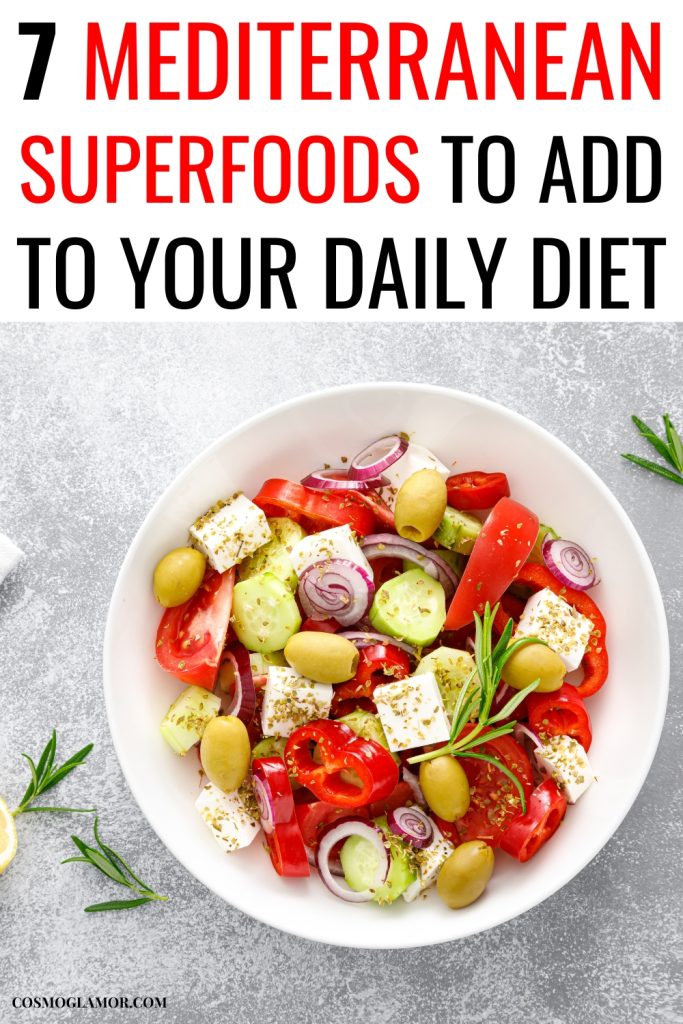Let's get real. We've all heard about the “Mediterranean Diet.” It consistently tops the “healthiest diets” lists, promising amazing health benefits. But unlike some fad diets, the Mediterranean approach is more than just a temporary fix. It's a way of life, a celebration of delicious, whole foods. And, it's packed with ingredients that are incredibly good for you. I learned this firsthand from my grandmother (I call her Yiayia, which is Greek for grandma). She lived a long, healthy life, and her kitchen was always filled with the aromas of these amazing foods.
So, what are these magical Mediterranean ingredients? Forget the hype – let’s talk about the real superfoods, the ones that should be staples in your kitchen.
1. Extra Virgin Olive Oil (EVOO): The Liquid Gold

Think of EVOO as the foundation of the Mediterranean food pyramid. It's not just any olive oil. We're talking about extra virgin olive oil, the first cold-pressed oil, which retains the most nutrients and flavor.
- Why it's awesome: It's loaded with monounsaturated fats (the good kind!) and antioxidants, which fight inflammation and protect your heart. Studies have shown it can help lower “bad” LDL cholesterol and even reduce the risk of stroke (The New England Journal of Medicine, 2013). These antioxidants, specifically polyphenols like oleocanthal, are what give EVOO its slightly peppery taste.
- How I use it: I drizzle it on salads, grilled veggies, fish, even a little bit on my morning toast. I also use it for cooking – just be mindful of the temperature.
Pro Tip: Heat EVOO over medium heat only! High heat can damage some of its beneficial compounds and affect the flavor.
2. Fatty Fish: Swim Your Way to Health

My Yiayia always insisted on fish. “Eat your fish!” she'd say, at least twice a week. Fatty fish like salmon, sardines, and mackerel are Mediterranean staples, and for good reason. They are packed with omega-3 fatty acids.
- Why it's awesome: Omega-3s are essential fats that our bodies can't make on their own. There are different types of omega-3s, and fatty fish are particularly rich in EPA (eicosapentaenoic acid) and DHA (docosahexaenoic acid). These two are superstars for brain health, helping to improve memory, focus, and even mood. They also reduce inflammation throughout the body and are crucial for heart health.
- How I use it: I try to eat fatty fish at least twice a week. Grilled salmon with lemon and herbs is a favorite, and I've even gotten into canned sardines (surprisingly delicious on toast with avocado!).
3. Nuts: Go Nuts for Your Health!

Walnuts and almonds, in particular, are nutritional powerhouses within the Mediterranean diet. They provide healthy fats that keep you going.
- Why It's Awesome: They provide healthy fats, including monounsaturated and polyunsaturated fats and are packed with fiber, keeping your digestion happy, and plant based protein. Walnuts are particularly high in alpha-linolenic acid (ALA), another type of omega-3 fatty acid.
- How I use it: A handful of nuts is my go-to afternoon snack. I also chop them up and add them to salads or sprinkle them on top of yogurt. Just watch the portion sizes – they are calorie-dense.
Pro Tip: Store nuts in the refrigerator or freezer to keep them fresh longer. The oils in nuts can go rancid if exposed to heat and light for extended periods.
4. Seeds: Tiny but Mighty

Chia seeds and flaxseeds might seem like trendy “health food” ingredients, but they've been part of the Mediterranean diet for centuries. These little seeds are nutritional giants.
- Why they're awesome: They're packed with fiber, omega-3s (specifically ALA), and antioxidants. Chia seeds are also surprisingly high in calcium. Flaxseeds are rich in lignans, plant compounds that have antioxidant and estrogen-like effects.
- How I use them: I sprinkle chia seeds on my oatmeal or yogurt, and I add ground flaxseeds to smoothies.
Pro Tip: Grind flaxseeds before you eat them. Whole flaxseeds can pass through your digestive system undigested, meaning you won't get all the benefits. A coffee grinder works perfectly!
5. Legumes: The Humble Heroes

Beans, lentils, chickpeas… these are the unsung heroes of the Mediterranean diet. They're affordable, filling, and incredibly versatile.
- Why they're awesome: They're packed with plant-based protein, fiber, and iron. They're also great for your gut health. Legumes contain both soluble and insoluble fiber. Soluble fiber helps lower cholesterol and stabilize blood sugar levels, while insoluble fiber adds bulk to your stool, preventing constipation.
- How I use them: Hummus is a staple in my house. I also love lentil soup, and I add chickpeas to salads and curries.
Pro Tip: If you're using canned beans, rinse them thoroughly before using them to reduce their sodium content.
6. Dark Leafy Greens: Eat Your Greens! (Seriously)

Spinach, kale, dandelion greens – these are packed with vitamins, minerals, and antioxidants. They are the nutritional work horses in this diet.
- Why they're awesome: They are good for your eyes, skin, and immune system, and for reducing inflammation. They are packed with vitamins A, C, and K, as well as folate and iron.
- How I use them: I add spinach to my smoothies, I make kale salads (massaging the kale with olive oil and lemon juice makes it much less bitter), and I even sauté dandelion greens with garlic and olive oil.
7. Tomatoes: The Red Jewels

Tomatoes are practically a symbol of the Mediterranean. They're eaten fresh, cooked into sauces, and even sun-dried. They are the flavor base of so many dishes.
- Why they're awesome: They're packed with lycopene, a powerful antioxidant that's been linked to a reduced risk of heart disease and certain cancers. Interestingly, cooking tomatoes increases the bioavailability of lycopene, meaning your body can absorb it more easily. This is because heat breaks down the cell walls of the tomato, releasing the lycopene.
- How I use them: I eat fresh tomatoes in salads, I make my own tomato sauce, and I love roasted tomatoes with garlic and herbs. My Yiayia's sofrito (a slow-cooked tomato sauce with olive oil, onions, and garlic) is legendary.
Pro Tip: When making tomato sauce, let it simmer for a long time (at least an hour, or even longer!). This develops the flavor and allows the lycopene to become more concentrated.
The Takeaway (and a Challenge)
The Mediterranean diet isn't about deprivation. It's about celebrating real, whole foods that are bursting with flavor and goodness. It's about eating with joy, sharing meals with loved ones, and nourishing your body.
So, here's my challenge to you: This week, try incorporating at least three of these superfoods into your meals. Don't be afraid to experiment, get creative, and have fun! And if you happen to make a culinary masterpiece (or even a delicious mess!), share it with someone. That's the real spirit of the Mediterranean way. If all else fails, blame the oven! It was probably too hot.



![The Top 7 Mediterranean Breakfasts That Aren't Eggs. 1[1]](https://cosmoglamor.com/wp-content/uploads/2025/10/11-150x150.jpg)

